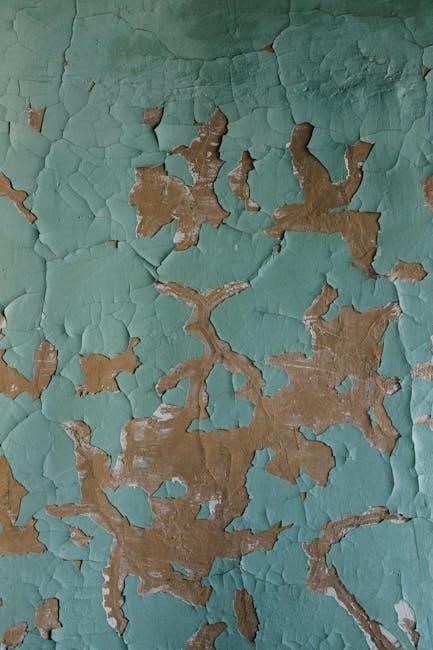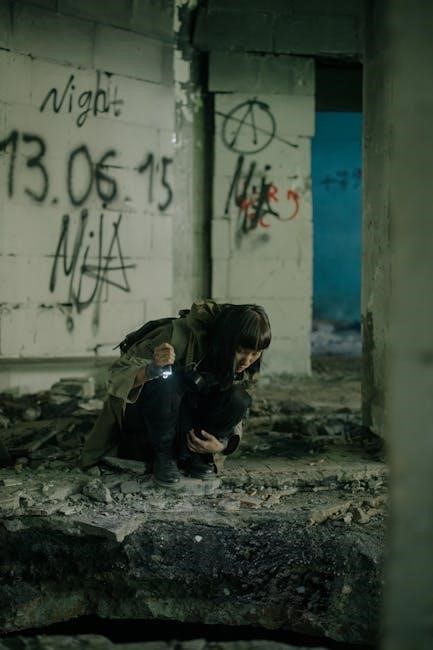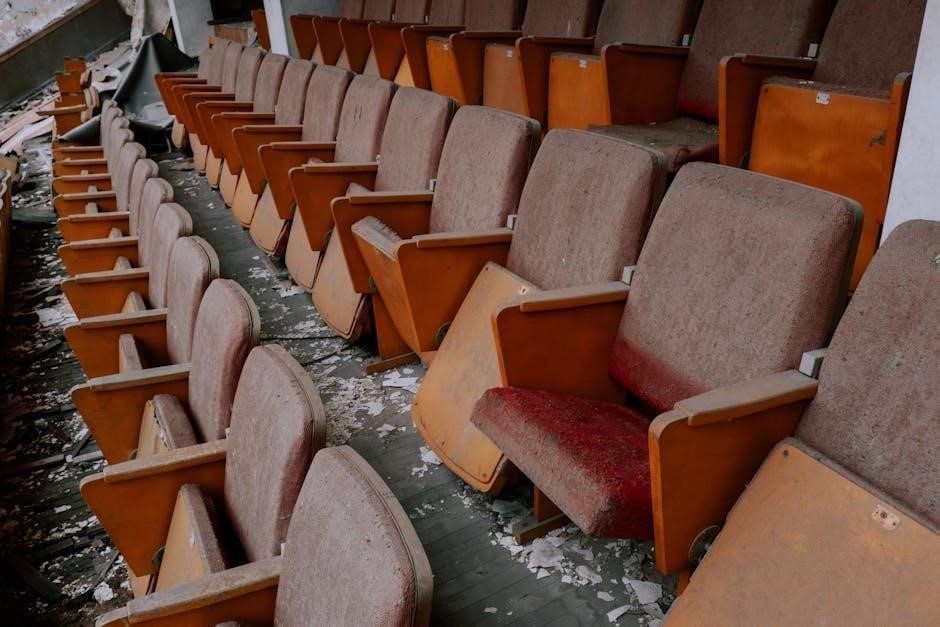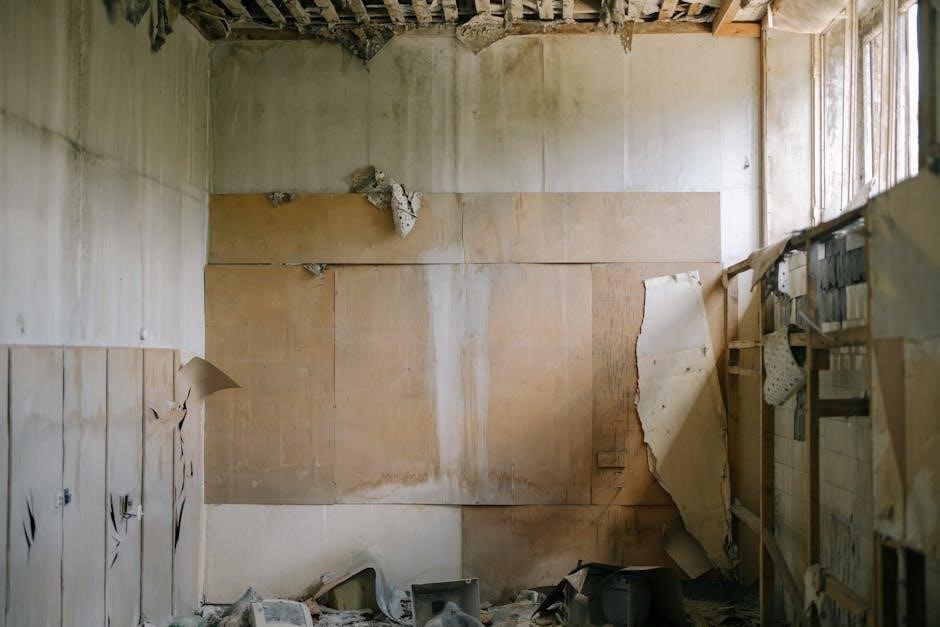Ruined, a Pulitzer Prize-winning play by Lynn Nottage, explores the devastating impact of war on women in the Democratic Republic of Congo. Set in a brothel, it delves into themes of gender violence, survival, and resilience, offering a haunting yet powerful portrayal of humanity amidst chaos. The PDF version is widely available, making it accessible for students and researchers worldwide to study Nottage’s profound commentary on war’s toll on women.
1.1 Brief Overview of the Play
Ruined by Lynn Nottage is a powerful drama set in a brothel during the civil war in the Democratic Republic of Congo. Mama Nadi, the brothel owner, navigates the dangers of war while providing refuge to women. The play explores themes of gender violence, survival, and resilience, offering a haunting portrayal of war’s impact on women. Nottage’s vivid storytelling, blending humor and realism, highlights the emotional and psychological scars left by conflict. The PDF version of the play is widely accessible, making it a valuable resource for studying Nottage’s profound commentary on war and humanity.
1.2 Importance of the PDF Version
The PDF version of Ruined is invaluable for its accessibility and convenience. It allows students and researchers to easily access Nottage’s work, facilitating deeper analysis of themes like gender violence and resilience. The format preserves the play’s structure and layout, ensuring an authentic reading experience. Its widespread availability has made it a popular choice for academic study, enabling global engagement with Nottage’s powerful exploration of war’s impact on women in the Democratic Republic of Congo.
Plot and Setting
Ruined unfolds in a brothel in a small mining town within the Democratic Republic of Congo, amidst a brutal civil war. The brothel, run by Mama Nadi, becomes a refuge for women escaping violence, while the war rages outside, shaping their lives and struggles.
2.1 The Brothel as a Central Location
The brothel in Ruined serves as a sanctuary and a prison, symbolizing survival and exploitation. Owned by Mama Nadi, it offers refuge to women fleeing war’s horrors while subjecting them to sexual exploitation. The brothel’s duality reflects the harsh realities of war, where women must navigate between safety and enslavement. This central location underscores the play’s exploration of gender violence, resilience, and the moral dilemmas faced by women in conflict zones. Its significance lies in its role as both a shelter and a site of ongoing oppression.
2.2 The Democratic Republic of Congo as the Backdrop
The Democratic Republic of Congo’s civil war provides the tumultuous setting for Ruined. The play is set in a small mining town, where the conflict over mineral resources fuels violence and displacement. The DRC’s chaotic backdrop highlights the exploitation of its people and resources, creating a dire environment for women and children. The war’s brutality and the struggle for control underscore the play’s themes of survival and resilience, as characters navigate the intersection of economic greed and human suffering amidst the devastation.
2.3 Civil War and Its Impact on Characters
The civil war in the Democratic Republic of Congo deeply shapes the lives of the characters in Ruined. Women like Salima and Sophie endure unimaginable physical and emotional trauma, while others struggle to survive in a world where their bodies are weapons of war. The conflict forces characters to confront loss, displacement, and moral compromise. The war’s chaos disrupts societal norms, leaving characters fractured yet resilient. Through their stories, the play highlights the human cost of conflict and the enduring strength of those caught in itscrossfire.

Main Characters
The play revolves around Mama Nadi, Salima, Sophie, and Christian, each representing diverse experiences amidst the chaos of war. Their stories intertwine, showcasing resilience and despair.
3.1 Mama Nadi: The Brothel Owner
Mama Nadi is a complex, shrewd businesswoman who runs a brothel in the Democratic Republic of Congo during the civil war. She maintains neutrality, catering to both rebels and government soldiers, ensuring her survival. Her tough exterior hides a deep understanding of the war’s brutality. Despite her harsh decisions, she offers a form of sanctuary to women like Salima and Sophie, showcasing her dual role as both protector and exploiter. Her character embodies the moral ambiguity of survival in a war-torn society.
3.2 Salima: A Victim of War
Salima, a young woman, is a tragic victim of the civil war in the Democratic Republic of Congo. She is brutally raped and enslaved by soldiers, leaving her physically and emotionally scarred. Brought to Mama Nadi’s brothel by Christian, Salima struggles to rebuild her life amidst the trauma. Her story highlights the devastating impact of gender violence and the resilience of women in war-torn regions. Despite her pain, Salima’s journey symbolizes the strength and survival instincts of those shattered by conflict.
3.3 Sophie: The Broken Spirit
Sophie, a deeply traumatized character, embodies the psychological toll of war on women. Her horrific experiences have left her with a shattered spirit, unable to trust or connect with others. Despite her physical presence in Mama Nadi’s brothel, Sophie’s inner world is marked by silence and emotional detachment. Her story underscores the long-lasting effects of sexual violence and the struggle to find hope in a world that seems determined to break her. Sophie’s journey is a poignant reminder of the invisible scars left by conflict.
3.4 Christian: The Trader and Survivor
Christian, a resourceful trader, navigates the treacherous landscape of war-torn Congo, surviving by his wits and resilience. He brings women like Sophie and Salima to Mama Nadi’s brothel, offering them a fragile refuge while profiting from their desperation. His pragmatic nature reflects the harsh realities of survival in a conflict zone, where morality often yields to necessity. Christian’s interactions with the women reveal both his humanity and the ethical ambiguities of his choices, making him a complex figure in the play’s exploration of survival and exploitation.

Themes in “Ruined”
Ruined explores themes of gender violence, survival, and economic exploitation, highlighting the resilience of women in war-torn Congo. Music plays a significant role in expressing their struggles and hope.
4.1 Gender Violence and Exploitation
Gender violence and exploitation are central themes in Ruined, as women face brutal sexual violence and emotional trauma during the civil war in Congo. The play sheds light on how women are targeted by both rebel forces and government soldiers, enduring physical and psychological abuse. Their bodies become battlegrounds, and their dignity is stripped away. The PDF version of the play highlights these atrocities, offering a raw and unflinching look at the gender-based violence that persists in war-torn regions, emphasizing the resilience of survivors despite their unimaginable suffering.
4.2 Survival and Resilience
In Ruined, survival and resilience are portrayed through the women’s ability to adapt and endure amidst chaos. Despite being subjected to extreme violence and exploitation, characters like Salima and Sophie find ways to cope, showcasing their strength. Mama Nadi’s brothel serves as both a refuge and a means of survival, highlighting how women navigate their circumstances to stay alive. The PDF version underscores these themes, illustrating how resilience becomes a lifeline for those caught in the crossfire of war and societal collapse, emphasizing their humanity in the face of unimaginable hardship.
4.3 Economic Exploitation in War Zones
Ruined highlights how war zones become hotbeds of economic exploitation, with resources and people exploited for profit. The mining industry in the Democratic Republic of Congo is depicted as a driving force behind the conflict, with minerals fueling violence. Mama Nadi’s brothel serves as a microcosm of this exploitation, where women’s bodies are commodified. The PDF version of the play underscores how economic greed exacerbates human suffering, with characters like Christian embodying the opportunism that thrives in war-torn regions, critiquing the systemic exploitation that perpetuates violence and inequality. The tragedy lies in the intersection of profit and human loss.
4.4 The Role of Music in the Play
Mama Nadi’s brothel in Ruined is filled with music, which serves as a form of escape and resilience for the characters. Songs and dance offer moments of joy amidst the chaos of war, creating a contrast between the harsh reality and the beauty of human expression. The PDF version emphasizes music as a survival mechanism, allowing characters like Sophie and Salima to momentarily forget their pain. Nottage uses music to highlight the strength and humanity of the women, providing a universal language that transcends their suffering and connects them to their cultural roots and each other.

Historical and Cultural Context
Ruined is set against the backdrop of the Democratic Republic of Congo’s civil war, highlighting the mining industry’s role in fueling conflict. The PDF explores the cultural devastation, emphasizing the plight of women caught in the crossfire of war and exploitation, offering a stark yet vital portrayal of their struggles and resilience;
5.1 The Democratic Republic of Congo’s Civil War
The Democratic Republic of Congo’s civil war, spanning decades, has been marked by brutal conflict over resources like minerals. The PDF version of Ruined by Lynn Nottage vividly portrays this backdrop, where armed groups and government forces clash, causing immense human suffering. The war’s impact is deeply felt by women, who face sexual violence, displacement, and exploitation. Nottage’s play sheds light on how the mining industry fuels the conflict, perpetuating cycles of violence and economic exploitation, leaving communities devastated and women disproportionately affected. The PDF highlights these themes, offering a haunting yet essential perspective on the region’s turmoil.
5.2 The Plight of Women in War-Torn Countries
In war-torn countries like the Democratic Republic of Congo, women face unimaginable horrors, including sexual violence, exploitation, and displacement. The PDF version of Ruined by Lynn Nottage sheds light on their suffering, highlighting how women are often targeted as weapons of war. The play portrays their resilience and survival amidst unimaginable trauma, emphasizing the psychological scars that linger long after the conflict ends. Nottage’s work underscores the global crisis of gender-based violence, urging readers to confront the harsh realities faced by women in conflict zones.
5.3 The Mining Industry and Its Impact
The mining industry plays a pivotal role in the conflict within the Democratic Republic of Congo, as depicted in Ruined. The exploitation of minerals like coltan and cobalt fuels the war, funding armed groups and perpetuating violence. The PDF version of the play highlights how mining areas become battlegrounds, displacing communities and causing environmental degradation. This exploitation not only enriches a few but also perpetuates human rights abuses, with women often bearing the brunt. The industry’s impact underscores the cyclical nature of greed, violence, and survival in war-torn regions.
Lynn Nottage’s Writing Style
Lynn Nottage’s writing in Ruined masterfully blends humor with dark themes, creating a stark yet poignant portrayal of war’s impact. Her realistic dialogue and emotional depth captivate readers, offering a vivid exploration of human resilience and exploitation, while maintaining a balance between hope and despair, making the play both haunting and thought-provoking.
6.1 Use of Humor in Dark Themes
Lynn Nottage skillfully incorporates humor into the dark, war-torn narrative of Ruined, creating a poignant contrast that underscores the resilience of her characters. While the play tackles brutal themes like sexual violence and exploitation, moments of wit and irony provide a temporary reprieve, humanizing the characters and making their struggles more relatable. This unique blend of humor and tragedy not only highlights the absurdity of war but also offers a glimpse into the survival mechanisms employed by those enduring unimaginable hardship. The PDF version captures this delicate balance, preserving the emotional depth and complexity of the play.
6.2 Realism and Emotional Depth
Lynn Nottage’s Ruined masterfully blends realism with emotional depth, immersing audiences in the harsh realities of war-torn Congo. The brothel setting and characters’ raw struggles create a vivid, unflinching portrayal of survival. Nottage’s dialogue captures the complexity of human emotions, from despair to resilience, making the characters’ journeys deeply relatable. The PDF version preserves this emotional intensity, allowing readers to engage with the play’s poignant themes and the unvarnished truth of life in a war zone. This balance of realism and emotion underscores the play’s enduring impact.
6.3 The Influence of Bertolt Brecht’s “Mother Courage”
Lynn Nottage’s Ruined draws inspiration from Bertolt Brecht’s Mother Courage, particularly in its exploration of survival and moral ambiguity during war. Like Brecht’s iconic character, Mama Nadi navigates a war-torn landscape, making tough decisions to survive. However, Nottage adapts this influence to a contemporary African context, blending Brechtian themes with the specific horrors faced by women in the Democratic Republic of Congo. The play’s structure and character dynamics reflect Brecht’s episodic style, yet Nottage adds a deeply personal, emotional layer to the narrative, distinguishing her work while paying homage to Brecht’s legacy.
The Significance of the Title “Ruined”
Ruined reflects the physical destruction and emotional scars of war, capturing the play’s exploration of gender violence, exploitation, and resilience. The title embodies the devastating consequences of conflict on individuals and communities, highlighting the lasting impact beyond mere physical damage.
7.1 Physical and Emotional Ruin
Ruined highlights the dual destruction of war, where women suffer both physical harm and deep emotional trauma. The play portrays how sexual violence leaves lasting scars, affecting their bodies and minds. The characters’ experiences reveal the brutal reality of conflict, where their humanity is stripped away. Nottage’s portrayal emphasizes that true ruin lies not just in the body but in the shattered spirits and lost futures of these women, leaving them emotionally and socially devastated.
7.2 Beyond Physical Destruction: Psychological Scars
Ruined delves into the psychological scars left by war, transcending physical destruction. Characters like Salima and Sophie endure mental anguish, their dignity shattered by sexual violence. The play illustrates how these scars hinder their ability to rebuild lives, creating long-lasting emotional wounds. Nottage’s work shows that psychological ruin can be more crippling than physical harm, leaving survivors with lasting trauma that haunts their existence and identity.

The PDF Version of “Ruined”
The PDF version of Ruined offers convenient access to Lynn Nottage’s powerful narrative. It preserves the play’s original formatting, making it ideal for academic study and research purposes globally.
8.1 Availability and Accessibility
The PDF version of Ruined is widely available online, ensuring easy access for readers worldwide. Platforms like Google Scholar, Scribd, and academic databases offer free or purchasable downloads. Its digital format makes it convenient for students and researchers to study Nottage’s work without physical constraints. The PDF is particularly popular due to its cost-effectiveness and portability, allowing for seamless sharing and reference in educational settings. This accessibility has made Ruined a valuable resource for exploring themes of war, gender, and resilience in academic and personal studies.
8.2 Features of the PDF Format
The PDF version of Ruined preserves the original layout and formatting, ensuring a consistent reading experience. It includes cast lists, character descriptions, and scene breakdowns, making it ideal for theatrical analysis. The file is easily accessible on multiple devices, maintaining clarity and quality. Its portability and searchability features enhance research and study. Additionally, the PDF format allows for annotations and highlighting, enabling readers to engage deeply with Nottage’s text. This versatility makes the PDF a practical choice for both academic and personal use.
8.3 Popularity Among Students and Researchers
The PDF version of Ruined is highly popular among students and researchers due to its accessibility and convenience. It provides a comprehensive overview of the play, including cast lists, character analyses, and scene descriptions. The format allows for easy annotations and highlighting, facilitating deep academic engagement. Researchers appreciate its portability across devices and searchability, making it an invaluable resource for studying Nottage’s work. Its widespread availability ensures that scholars worldwide can access and analyze this critical exploration of war’s impact on women.

Critical Reception of “Ruined”
Ruined received widespread acclaim, earning the 2009 Pulitzer Prize for Drama. Critics praised its powerful portrayal of war’s impact on women, with scholars drawing comparisons to Nottage’s other works.
9.1 Pulitzer Prize for Drama (2009)
Ruined earned Lynn Nottage the prestigious Pulitzer Prize for Drama in 2009. This recognition highlighted the play’s powerful exploration of gender violence and survival in the DRC. The award acknowledged Nottage’s ability to blend harsh realities with emotional depth, creating a haunting yet essential narrative. The Pulitzer Prize cemented Ruined’s place as a significant work in contemporary theater, praised for its unflinching portrayal of war’s impact on women and its resonance beyond the stage.
9.2 Reviews and Scholarly Analysis
Ruined has received widespread critical acclaim for its raw portrayal of war’s impact on women. Scholars praise Nottage’s ability to weave humor into dark themes, creating a nuanced exploration of exploitation and resilience. The play’s setting in a brothel serves as a microcosm for broader societal issues, drawing attention to the commodification of women’s bodies during conflict. Academic analyses often highlight the emotional depth and the play’s ability to humanize victims of war, making it a crucial text for studies on gender, trauma, and survival.
9.3 Comparisons with Other Works by Nottage
Ruined is often compared to Lynn Nottage’s earlier works, such as Intimate Apparel and Fabulation. Both explore themes of identity and survival, particularly among marginalized women. Critics note that Ruined builds on Nottage’s signature style, blending raw emotion with subtle humor. However, its unflinching portrayal of war’s brutality sets it apart. Scholars also draw parallels with her later play Sweat, highlighting Nottage’s consistent focus on systemic oppression and human resilience across different contexts.
The Play’s Legacy
Ruined has left a lasting impact on theater and literature, inspiring global performances and sparking crucial conversations about gender violence and war. Its availability in PDF format has further cemented its influence, making it a vital resource for students and researchers worldwide.
10.1 Impact on Theater and Literature
Ruined has significantly influenced contemporary theater and literature, earning Lynn Nottage the Pulitzer Prize for Drama in 2009. Its unflinching portrayal of war’s impact on women has inspired adaptations and global performances, solidifying its place as a seminal work. The play’s availability in PDF format has further enhanced its reach, making it a vital resource for scholars and students; Its exploration of gender violence and resilience continues to resonate, shaping modern playwriting and fostering critical discussions on social justice and human rights.
10.2 Adaptations and Performances Worldwide
Ruined has been widely adapted and performed globally, with notable productions in London’s Almeida Theatre and other international stages. Its universal themes have made it a favorite in theaters worldwide, drawing diverse audiences. The PDF version has facilitated easy access for directors and actors, enabling productions to stay true to Nottage’s vision. Performances have not only highlighted the play’s emotional depth but also sparked crucial conversations about gender violence and war’s consequences, ensuring its relevance across cultures and continents.
10.3 Influence on Modern Playwriting
Ruined has left an indelible mark on modern playwriting, inspiring a new wave of socially conscious dramas. Its unflinching portrayal of war’s impact on women has influenced playwrights to tackle similar themes with raw honesty. Nottage’s blend of humor, realism, and emotional depth has set a high standard for contemporary theater. The play’s success has also encouraged more diverse voices to share stories of marginalized communities, making it a benchmark for impactful storytelling. Its influence continues to resonate, shaping the future of playwriting with its bold and unapologetic narrative style.
Ruined by Lynn Nottage is a masterpiece that vividly portrays war’s impact on women, emphasizing resilience and survival. Its PDF version ensures accessibility, preserving its relevance for future generations. The play’s profound themes and Nottage’s compelling storytelling continue to inspire, making it a timeless work in modern theater and literature. Its enduring importance lies in its ability to provoke thought and spark change, solidifying its place as a crucial piece of contemporary drama.
11.1 Summary of Key Points
Ruined by Lynn Nottage is a poignant exploration of war’s impact on women in the Democratic Republic of Congo. The play, set in Mama Nadi’s brothel, highlights gender violence, survival, and resilience. The PDF version enhances accessibility, making it a vital resource for scholars. Nottage’s work underscores the human cost of conflict and the strength of women amidst chaos, ensuring its relevance in understanding war’s societal effects and advocating for change through compelling storytelling.
11.2 Final Thoughts on the Play’s Relevance
Ruined remains a powerful commentary on gender violence, survival, and resilience, offering a haunting portrayal of war’s impact on women. Its relevance lies in its ability to spark crucial conversations about human rights and social justice. The play’s emotional depth, coupled with its accessibility in PDF format, ensures it continues to resonate with audiences and scholars worldwide, solidifying its place as a vital work in contemporary theater and literature.
11.3 The Enduring Importance of “Ruined” in PDF Format
The PDF version of Ruined ensures its enduring importance by making the play accessible to a global audience. Its digital format allows for easy distribution, enabling students, researchers, and theater enthusiasts to engage with Nottage’s work effortlessly. The PDF preserves the play’s layout and emotional impact, maintaining its integrity while reaching new readers. This accessibility has cemented Ruined as a cornerstone of modern theater, ensuring its themes of survival and resilience continue to inspire and educate future generations.